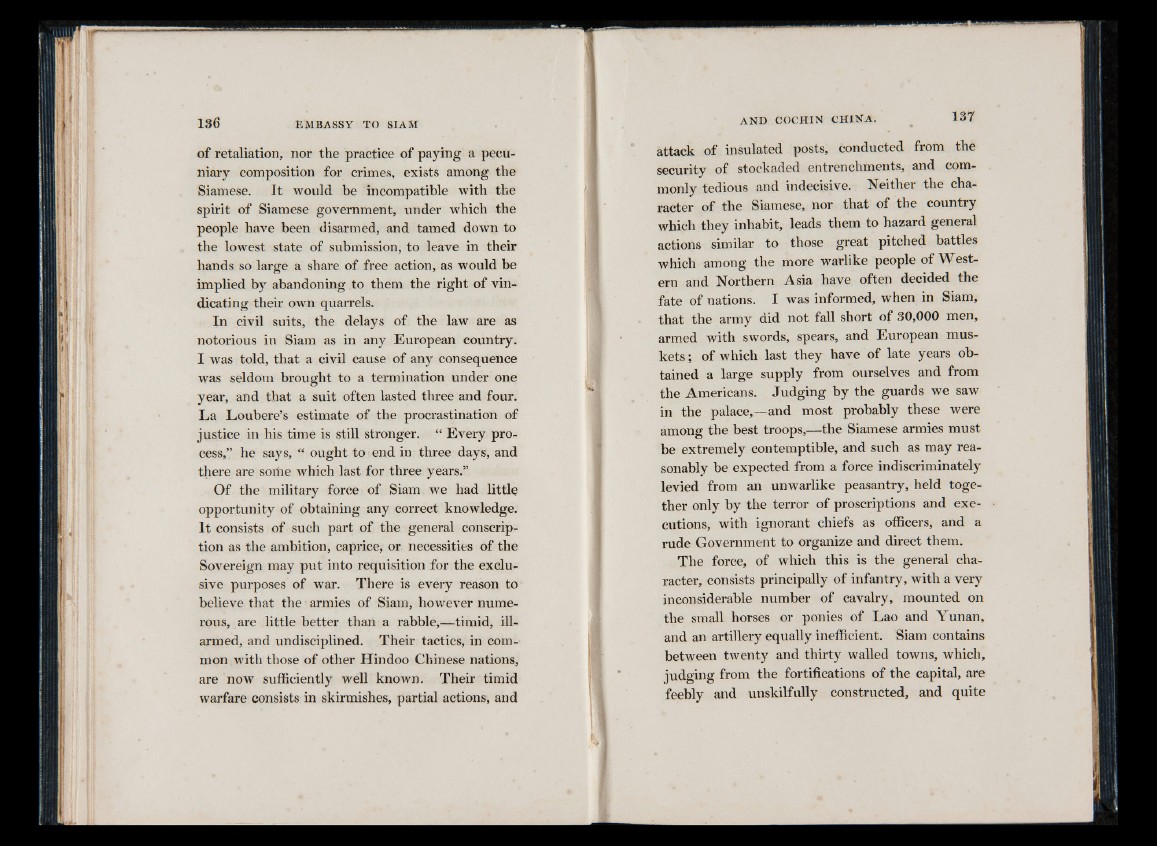
of retaliation, nor the practice of paying a pecuniary
composition for crimes, exists among the
Siamese. It would be incompatible with the
spirit of Siamese government, under which the
people have been disarmed, and tamed down to
the lowest state of submission, to leave in their
hands so large a share of free action, as would be
implied by abandoning to them the right of vindicating
their own quarrels.
In civil suits, the delays of the law are as
notorious in Siam as in any European country.
I was told, that a civil cause of any consequence
was seldom brought to a termination under one
year, and that a suit often lasted three and four.
La Loubere’s estimate of the procrastination of
justice in his time is still stronger. “ Every process,”
he says, § ought to end in three days, and
there are sorhe Avhich last for three years.”
Of the military force of Siam we had little
opportunity of obtaining any correct knowledge.
I t consists of such part of the general conscription
as the ambition, caprice, or necessities of the
Sovereign may put into requisition for the exclusive
purposes of war. There is every reason to
believe that the armies of Siam, however numerous,
are little better than a rabble,—timid, illarmed,
and undisciplined. Their tactics, in common
with those of other Hindoo Chinese nations,
are now sufficiently well known. Their timid
warfare consists in skirmishes, partial actions, and
attack of insulated posts, conducted from the
Security of stockaded entrenchments, and commonly
tedious and indecisive. Neither the character
of the Siamese, nor that of the country
which they inhabit, leads them to hazard general
actions similar to those great pitched battles
which among the more warlike people of Western
and Northern Asia have often decided the
fate of nations. I was informed, when in Siam,
that the army did not fall short of 30,000 men,
armed with swords, spears, and European muskets
; of which last they have of late years obtained
a large supply from ourselves and from
the Americans. Judging by the guards we saw
in the palace,—and most probably these were
among the best troops,—the Siamese armies must
be extremely contemptible, and such as may reasonably
be expected from a force indiscriminately
levied from an unwarlike peasantry, held together
only by the terror of proscriptions and executions,
with ignorant chiefs as officers, and a
rude Government to organize and direct them.
The force, of which this is the general character,
consists principally of infantry, with a very
inconsiderable number of cavalry, mounted on
the small horses or ponies of Lao and Yunan,
and an artillery equally inefficient. Siam contains
between twenty and thirty walled towns, which,
judging from the fortifications of the capital, are
feebly and unskilfully constructed, and quite